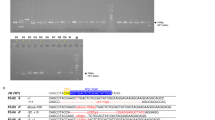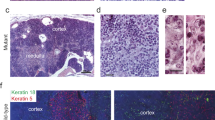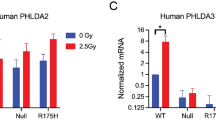Abstract
MICE homozygous for the scid mutation on chromosome 16 have a severe combined immune deficiency1,2 as a result of their inability to correctly rearrange their immunoglobulin and T-cell receptor genes3,4. In scid mice, when precursors for B and T lymphocytes reach the stage of development requiring expression of these surface receptors, a defective recombinase system aberrantly cuts and rejoins the receptor gene segments greatly reducing the efficiency of producing functional receptors. As a result, most scid mice have no detectable B or T lymphocytes. We have demonstrated that the scid defect is not specific to lymphocyte development. Myeloid cells and fibroblasts from scid mice show a marked increase in sensitivity to ionizing radiation, indicating that the scid mutation leads to an inability to repair DNA damage induced by ionizing radiation as well as interfering with rearrangement of the immunoglobulin and T-cell receptor genes.
This is a preview of subscription content, access via your institution
Access options
Subscribe to this journal
Receive 51 print issues and online access
$199.00 per year
only $3.90 per issue
Buy this article
- Purchase on SpringerLink
- Instant access to full article PDF
Prices may be subject to local taxes which are calculated during checkout
Similar content being viewed by others
References
Bosma, G. C. et al. Immunogenetics 29, 54–57 (1989).
Bosma, G. C., Custer, R. P. & Bosma, M. J. Nature 301, 527–530 (1983).
Malynn, B. A. et al. Cell 54, 453–460 (1988).
Schuler, W. et al. Cell 46, 963–972 (1986).
Till, J. E. & McCulloch, E. A. Radiat. Res. 14, 213–222 (1961).
Dorshkind, K. et al. J. Immun. 132, 1804–1808 (1984).
Till, J. E. & McCulloch, E. A. Ann. N.Y. Acad. Sci. 114, 115–125 (1964).
Magli, M. C., Dick, J. E., Huszar, D., Bernstein, A. & Phillips, R. A. Proc. natn. Acad. Sci. U.S.A. 84, 789–793 (1987).
Fulop, G. M. & Phillips, R. A. J. Immun. 136, 4438–4443 (1986).
Fulop, G. M., Wu, D. D. & Phillips, R. A. in The Scid Mouse. Characterization and Potential Uses (eds Bosma, M. J., Phillips, R. A. & Schuler, W.) 171–180 (Springer, Heidelberg, 1989).
Grosschedl, R., Weaver, D., Baltimore, D. & Constantini, F. Cell 38, 647–658 (1984).
Countryman, P. I. & Heddle, J. A. Mutat. Res. 41, 1343–1347 (1976).
Goddard, A. D., Heddle, J. A., Gallie, B. L. & Phillips, R. A. Mutat. Res. 152, 31–38 (1985).
Paterson, M. C., Bech-Hansen, N. T., Smith, P. J. & Mulvihill, J. J. in Radiation Carcinogenesis: Epidemiology and Biological Significance (eds Boice, J. D., jr & Fraumeni, J. F., jr) 319–336 (Raven, New York, 1984).
McKinnon, P. J. Mum. Genet. 75, 197–208 (1987).
Roifman, C. M. & Gelfand, E. W. in Ataxia-Telangiectasia. Genetics, Neuropathology, and Immunology of a Degenerative Disease of Childhood (eds Gatti, R. A. & Swift, M.) 273–285 (Alan R. Liss, New York, 1985).
Kim, M.-G., Schuler, W., Bosma, M. J. & Marcu, K. B. J. Immun. 141, 1341–1347 (1988).
Tutt, M. et al. J. Immun. 138, 2338–2344 (1987).
Arlett, C. F., Harcourt, S. A., Teo, I. A. & Broughton, B. C. in Ataxia Telangiectasia—A Cellular and Molecular Link Between Cancer, Neuropathology and Immune Deficiency (eds Bridges, B. A. & Harnden, D. G.) 347–353 (Wiley, London, 1982).
Schatz, D. G., Oettinger, M. A. & Baltimore, D. Cell 59, 1035–1048 (1989).
Blackwell, T. K. & Alt, F. W. in Molecular Immunology (eds Hames, B. D. & Glover, D. M.) 1–60 (IRL, Oxford, 1988).
Cunningham, J. R., Bruce, W. R. & Webb, H. P. Phys. med. Biol. 10, 318–332 (1965).
Iscove, N. N., Guilbert, L. J. & Weyman, C. Expl Cell. Res. 126, 121–126 (1980).
Author information
Authors and Affiliations
Rights and permissions
About this article
Cite this article
Fulop, G., Phillips, R. The scid mutation in mice causes a general defect in DNA repair. Nature 347, 479–482 (1990). https://doi.org/10.1038/347479a0
Received:
Accepted:
Issue Date:
DOI: https://doi.org/10.1038/347479a0
This article is cited by
-
A highly efficient and faithful MDS patient-derived xenotransplantation model for pre-clinical studies
Nature Communications (2019)
-
Human RAG mutations: biochemistry and clinical implications
Nature Reviews Immunology (2016)
-
The orthotopic xenotransplant of human glioblastoma successfully recapitulates glioblastoma-microenvironment interactions in a non-immunosuppressed mouse model
BMC Cancer (2014)
-
Human allograft rejection in humanized mice: a historical perspective
Cellular & Molecular Immunology (2012)
-
Can Humanized Mice Reflect the Complex Pathobiology of HIV-Associated Neurocognitive Disorders?
Journal of Neuroimmune Pharmacology (2012)



